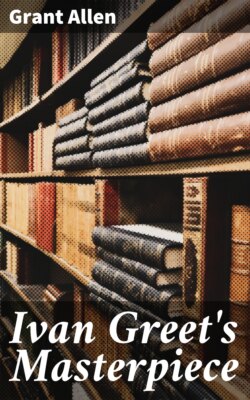Читать книгу Ivan Greet's Masterpiece - Allen Grant - Страница 6
На сайте Литреса книга снята с продажи.
II.
ОглавлениеTable of Contents
“It’s a most regrettable incident!” Ivan Greet said solemnly.
The rest turned and looked. Ivan Greet was their poet. He was tall and thin, with strange, wistful eyes, somewhat furtive in tone, and a keen, sharp face, and lank, long hair that fell loose on his shoulders. It was a point with this hair to be always abnormally damp and moist, with a sort of unnatural and impalpable moisture. The little coterie of authors and artists to which Ivan belonged regarded him indeed with no small respect, as a great man manqué. Nature, they knew, had designed him for an immortal bard; circumstances had turned him into an occasional journalist. But to them, he represented Art for Art’s sake. So when Ivan said solemnly, “It’s a most regrettable incident,” every eye in the room turned and stared at him in concert.
“Why so, me dear fellow?” Paddy O’Connor asked, open-eyed. “I call it magnificent!”
But Ivan Greet answered warmly, “Because it’ll take him still further away than ever from his work in life, which you and I know is science and philosophy.”
“And yer own grand epic?” Paddy suggested, with a smart smile, pouncing down like a hawk upon him.
Ivan Greet coloured—positively coloured—“blushed visibly to the naked eye,” as Paddy observed afterwards, in recounting the incident to his familiar friend at the United Bohemians. But he stood his ground like a man and a poet for all that. “My own epic isn’t written yet—probably never will be written,” he answered, after a pause, with quiet firmness. “I give up to the Daily Telephone what was meant for mankind: I acknowledge it freely. Still, I’m sorry when I see any other good man—and most of all Charlie Powell—compelled to lose his own soul the same way I myself have done.” He paused and looked round. “Boys,” he said, addressing the table, “in these days, if any man has anything out of the common to say, he must be rich and his own master, or he won’t be allowed to say it. If he’s poor, he has first to earn his living; and to earn his living he’s compelled to do work he doesn’t want to do—work that stifles the things which burn and struggle for utterance within him. The editor is the man who rules the situation; and what the editor asks is good paying matter. Good paying matter Charlie can give him, of course: Charlie can give him, thank Heaven, whatever he asks for. But this hack-work will draw him further and further afield from the work in life for which God made him—the philosophical reconstitution of the world and the universe for the twentieth century. And that’s why I say—and I say it again—a most regrettable incident!”
Charlie Powell set down his glass of champagne untasted. Ivan Greet was regarded by his narrow little circle of journalistic associates as something of a prophet; and his words, solemnly uttered, sobered Charlie for a while—recalled him with a bound to his better personality. “Ivan’s right,” he said slowly, nodding his head once or twice. “He’s right, as usual. We’re all of us wasting on weekly middles the talents God gave us for a higher purpose. We know it, every man Jack of us. But Heaven help us, I say, Ivan: for how can we help ourselves? We live by bread. We must eat bread first, or how can we write epics or philosophies afterwards? This age demands of us the sacrifice of our individualities. It will be better some day, perhaps, when Bellamy and William Morris have remodelled the world: life will be simpler, and bare living easier. For the present I resign myself to inevitable fate. I’ll write middles for Morrison, and eat and drink; and I’ll wait for my philosophy till I’m rich and bald, and have leisure to write it in my own hired house in Fitzjohn’s Avenue.”
Ivan Greet gazed across at him with a serious look in those furtive eyes. “That’s all very well for you!” he cried half angrily, in a sudden flaring forth of long-suppressed emotion. “Philosophy can wait till a man’s rich and bald; it gains by waiting; it’s the better for maturity. But poetry!—ah, there, I hate to talk about it! Who can begin to set about his divine work when he’s turned sixty and worn out by forty years of uncongenial leaders? The thing’s preposterous. A poet must write when he’s young and passionate, or not at all. He may go on writing in age, of course, as his blood grows cool, if he’s kept up the habit, like Wordsworth and Tennyson: he may even let it lie by or rust for a time, like Milton or Goethe, and resume it later, if he throws himself meanwhile, heart and soul, into some other occupation that carries him away with it resistlessly for the moment; but spend half his life in degrading his style and debasing his genius by working for hire at the beck and call of an editor—lose his birthright like that, and then turn at last with the bald head you speak about to pour forth at sixty his frigid lyrics—I tell you, Charlie, the thing’s impossible! The poet must work, the poet must acquire his habits of thought and style and expression in the volcanic period; if he waits till he’s crusted over and encysted with age, he may hammer out rhetoric, he may string fresh rhymes, but he’ll never, never give us one line of real poetry.”
